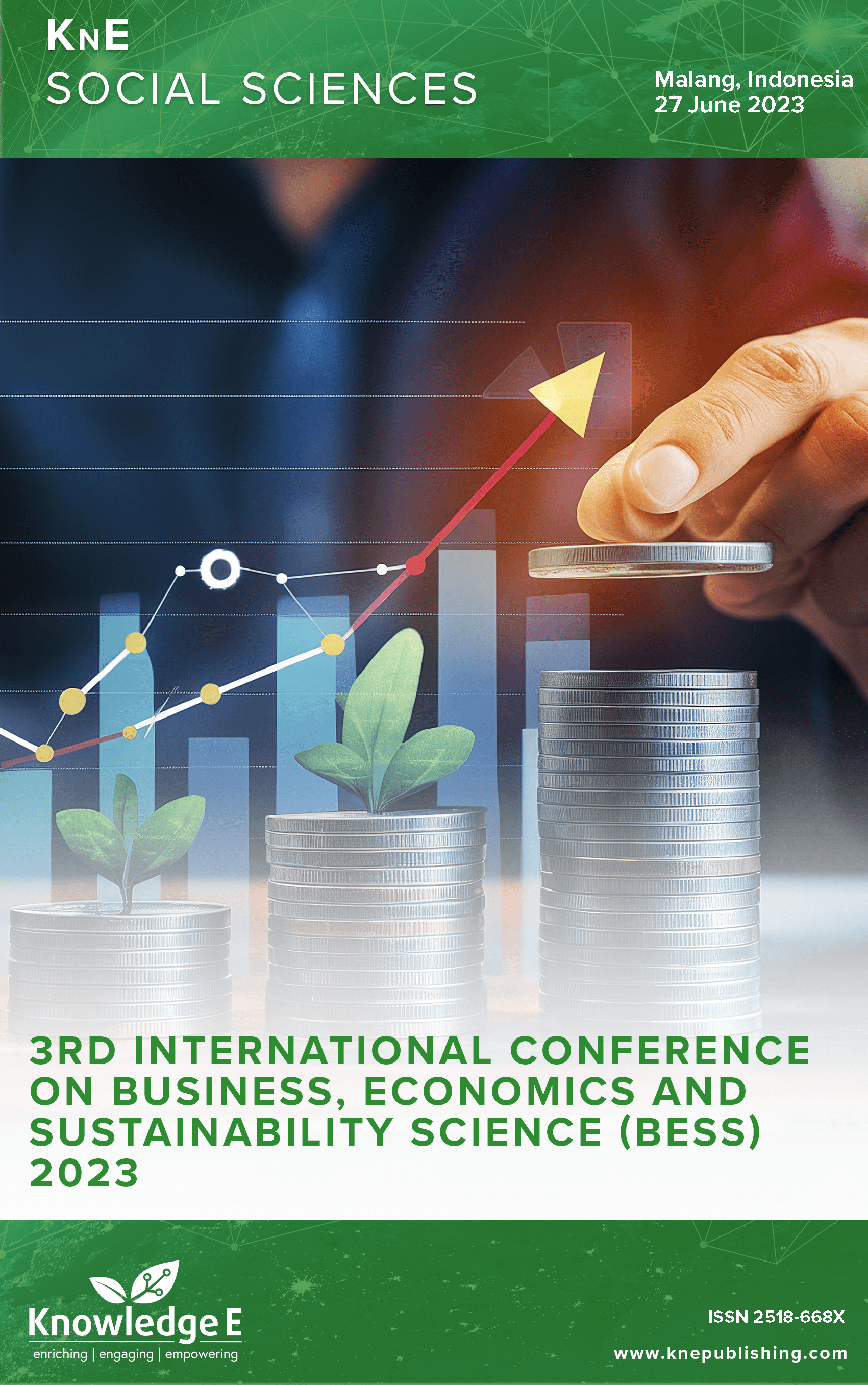Implementation of the EDDPEA Model in Entrepreneurship Learning
DOI:
https://doi.org/10.18502/kss.v9i21.16755Abstract
Limited access to direct interaction during the COVID-19 pandemic led to several constraints in the fields of learning and education. Barriers are a challenge for educators and students to continue and carry out learning even if it is limited to face-to-face discussions. Entrepreneurship courses that require a lot of discussion are also boldly transferred. However, learning that is carried out boldly is a solution for educators and students to continue to carry out learning activities using digital platforms. Bold learning requires a learning model that can support and facilitate access to learning. EDDPEA model is one such models used by educators to deliver entrepreneurship learning materials to students. The purpose of this study is to describe the implementation of the EDDPEA model in entrepreneurship learning to improve cooperative skills. The results show that the EDDPEA model can use students’ ability in the form of developing creative products resulting from collaboration. Products can be developed through planning, production, and marketing processes. These stages train students to implement Envision, Design, Development, Presentation, Enhance, Assessment (EDDPEA) in overall entrepreneurship learning. Learning carried out in collaboration can improve cooperative skills. The conclusion of this study is that the EDDPEA model is not only suitable in bold learning but also for general learning and can be applied prospectively because it is a joint project to improve cooperative skills.
Keywords: EDDPEA model, entrepreneurship learning, cooperative skills
References
Ali S, Hamidah A. Pembelajaran Daring di Tengah Wabah Covid-19. Jurnal BIODIK: Jurnal Ilmiah Pendidikan Biologi. 2020;6(02):214–24. DOI: https://doi.org/10.22437/bio.v6i2.9759
Ayu T, Dewi P, Sadjiarto A. Pelaksanaan Pembelajaran Daring Pada Masa Pandemi Covid-19. JURNAL BASICEDU. 2021;5(4):1909–17. DOI: https://doi.org/10.31004/basicedu.v5i4.1094
Dawson K, Beattie AE. Locating the Educator in Outdoor Early Childhood Education. Australian Journal Of Environmental Education. 2018;34(2):127–42. DOI: https://doi.org/10.1017/aee.2018.24
Dewi WA. Dampak Covid-19 terhadap Implementasi Pembelajaran Daring di Sekolah Dasar. Edukatif : Jurnal Ilmu Pendidikan. 2020;2(1):55–61. DOI: https://doi.org/10.31004/edukatif.v2i1.89
Dianastiti FE. Pembelajaran Berbicara Berbasis Literasi Informasi dengan Model Cooperative Learning untuk Meningkatkan Higher Order of Thinking Skill (HOTS) Peserta Didik Kelas XI SMA. Indonesian Journal of Education and Learning. 2019;2(2):260–8. DOI: https://doi.org/10.31002/ijel.v2i2.1710
Ernawati, Rosalina, L., & Dewi, M. (2021). The Effectiveness E Learning of Entrepreneurship Courses at State University of Padang during the COVID 19 Pandemic Efektivitas E Learning Mata Kuliah Kewirausahaan di Universitas Negeri Padang pada Masa Pandemi COVID 19. IJIRSE: Indonesian Journal of Informatic Research and Software Engineering Journal, 1(1), 9–15. DOI: https://doi.org/10.57152/ijirse.v1i1.39
Fadhilah P, Iriawan SB, Riyadi AR. Penerapan Model Treasure Hunt untuk Meningkatkan Kemampuan Kerjasama Siswa kelas V SD. Jurnal Pendidikan Guru Sekolah Dasar. 2019;4(2):121–34.
Hamid R, Sentryo I, Hasan S. Online learning and its problems in the Covid-19 emergency period. Jurnal Prima Edukasia. 2020;8(1):85–94. DOI: https://doi.org/10.21831/jpe.v8i1.32165
Handarini OI, Wulandari SS. Pembelajaran Daring Sebagai Upaya Study From Home (SFH) Selama Pandemi Covid 19 Pembelajaran Daring Sebagai Upaya Study From Home (SFH) [ JPAP]. Jurnal Pendidikan Administrasi Perkantoran. 2020;8(1):496– 503. DOI: https://doi.org/10.26740/jpap.v8n3.p496-503
Hapsari TP. (2018). Peran Lingkungan Kampus dalam Memoderasi Pengaruh Mata Kuliah Kewirausahaan terhadap Minat Wirausaha. Hapsari, T. P. (n.d.). Peran Lingkungan Kampus Dalam Memoderasi Pengaruh Mata Kuliah Kewirausahaan Terhadap Minat Wirausaha. 6(2), 197–214. Https://Doi.Org/10.26740/Jepk.V6n2.P197- 214, 6(2), 197–214. https://doi.org/10.26740/jepk.v6n2.p197-214. DOI: https://doi.org/10.26740/jepk.v6n2.p197-214
Harnani, N., Amijaya, D. T., & Setiadiwibawa, L. (2020). Model Pembelajaran Kewirausahaan Kreatif melalui Praktek Usaha dalam Menumbuhkan Kreativitas dan Inovatif Mahasiswa. Sosiohumaniora - Jurnal Ilmu-Ilmu Sosial Dan Humaniora, 22(1), 79–87. https://doi.org/10.24198/sosiohumaniora.v22i1.24510. DOI: https://doi.org/10.24198/sosiohumaniora.v22i1.24510
Kanoknitanunt P, Nilsook P, Wannapiroon P. Imagineering Learning With Logical Problem Solving. Journal of Education and Learning. 2021;10(3):112–21. DOI: https://doi.org/10.5539/jel.v10n3p112
Meliani D, Panduwinata LF. Pengaruh Mata Kuliah Kewirausahaan dan Motivasi Berwirausaha terhadap Pembentukan Jiwa Green Entrepreneur Mahasiswa [ JPAP]. Jurnal Pendidikan Administrasi Perkantoran. 2022;10(1):16–30. DOI: https://doi.org/10.26740/jpap.v10n1.p16-30
Mseleku Z. A Literature Review of E-Learning and E-Teaching in the Era of Covid-19 Pandemic. International Journal of Innovative Science and Research Technology. 2020;5(10):588–97.
Muhtasin. (2018). Upaya Penerapan Metode Cooperative Learning Tipe Group Investigation untuk Meningkatkan Hasil Belajar dan Keterampilan Membaca Bahasa Inggris Siswa. Jurnal Pedadogy, 2(2), 59–69. DOI: https://doi.org/10.23887/jp2.v2i2.17908
Mukarrom L, Widiyanto B, Arfiani Y. Peningkatan Creative Thinking Skill Peserta Didik melalui Model Cooperative Learning Berbantu Peta Konsep pada Tema Pencemaran Lingkungan [ Jurnal Edukasi Matematika Dan Sains]. JEMS. 2019;7(2):73–81. DOI: https://doi.org/10.25273/jems.v7i2.5294
Nilsook P, Wannapiroon P. Imagineering. Journal of Technical Education Development. 2013 Apr-Jun;25(86):33–7.
Ningsih, S., Kurniah, N., & D., D. Penerapan Metode Cooperative Learning untuk Meningkatkan Kemampuan Kognitif. Jurnal Ilmiah Potensia. 2016;1(2):100–6.
Nursita L. Dampak Mata Kuliah Kewirausahaan terhadap Minat Berwirausaha Mahasisw. Jurnal IDEAS: pendidikan. Sosial Dan Budaya. 2021;7(3):83–8. DOI: https://doi.org/10.32884/ideas.v7i3.401
Oktavian R, Aldya RF. Efektivitas Pembelajaran Daring Terintegrasi di Era Pendidikan 4.0. Didaktis: Jurnal Pendidikan Dan Ilmu Pengetahuan. 2020;20(2):129–35. DOI: https://doi.org/10.30651/didaktis.v20i2.4763
Pornsawan, P., Wannapiroon, P., & Nilsook, P. (2019). Imagineering Gamification on Cloud Technology to Enhance the Innovative Skill. International Journal of EEducation, e-Business, e-Management and e-Learning Imagineering, 9(2), 123–130. https://doi.org/10.17706/ijeeee.2019.9.2.123-130. DOI: https://doi.org/10.17706/ijeeee.2019.9.2.123-130
Sanglub A, Nilsook P, Wannapiroon P. Imagineering on Augmented Reality and Digital Twin for Digital Competence. Int J Inf Educ Technol. 2019;9(3):213–7. DOI: https://doi.org/10.18178/ijiet.2019.9.3.1201
Santika IW. Pendidikan Karakter pada Pembelajaran Daring. Indonesian Values and Character Education Journal. 2020;3(1):8–19. DOI: https://doi.org/10.23887/ivcej.v3i1.27830
Techakosit S, Nilsook P. The Development of STEM Literacy Using the Learning Process of Scientific Imagineering through AR [IJET]. Int J Emerg Technol Learn. 2018;13(1):230–8. DOI: https://doi.org/10.3991/ijet.v13i01.7664
Thornber K. (2017). Education for the Future. In theories and methodologies Education PMLA 133.3 (2018), published by the Modern Language Association of America (pp. 700–706). DOI: https://doi.org/10.1632/pmla.2018.133.3.700
Wannapiroon P, Nilsook P, Kaewrattanapat N, Wannapiroon N, Supa W. (2021). Augmented Reality Interactive Learning Model, using the Imagineering Process for the SMART Classroom. TEM Journal, 10(3), 1404–1417. https://doi.org/10.18421/TEM103. DOI: https://doi.org/10.18421/TEM103-51
Widnyana IW, Widyawati SR, Warmana GO. Pengaruh pemberian mata kuliah kewirausahaan dan pelatihan wirausaha terhadap minat wirausaha ekonomi kreatif pada mahasiswa unmas denpasar. Jurnal Bakti Masyarakat Indonesia. 2018;1(1):171– 7.
Zulaidah R, Widodo J. Penanaman Sikap Kewirausahaan Melalui Praktik Kejuruan Produk Kreatif dan Kewirausahaan. Economic Education Analysis Journal T. 2020;9(2):456–72.

